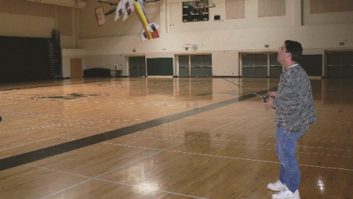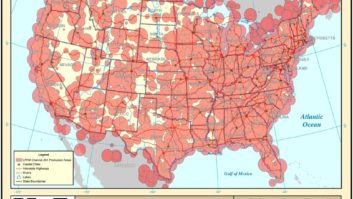Relaxed LPFM interference rules
May 1, 2004 12:00 PM, By Harry Martin
In a February report to Congress, the FCC recommended the elimination of the third-adjacent distance requirements that are currently holding back hundreds of low power FM (LPFM) applications. If Congress accepts these recommendations, the fledgling LPFM industry may soon begin to flourish, much to the chagrin of some full-power stations and networks.

In January 2000, the Commission authorized the new LPFM service and imposed minimum distance separation requirements for LPFM stations consistent with existing FM protection standards on the same and the two immediately adjacent channels, but not third-adjacent channels. The first applications were filed in May of 2000. In response to continuing complaints from the NAB, NPR and others, and after determining that LPFM stations would not cause unacceptable interference to stations operating on third-adjacent channels, the Commission adopted complaint and license modification procedures to ensure that significant third-adjacent channel interference problems would be resolved expeditiously.
Congress then stepped in, enacting legislation requiring third-adjacent channel minimum distance separation requirements for LPFM and mandating that the Commission conduct an experimental program to determine whether LPFM stations would cause interference to existing FM stations if the LPFM stations were licensed without third-adjacent channel protection requirements.
In July 2001, MITRE conducted LPFM tests and concluded that LPFM-induced third-adjacent channel interference occurred only when the test receiver was in close proximity to LPFM transmitters. It therefore followed that, if reasonable transmitter emissions standards were established, third-adjacent channel interference would have relatively little impact on full power FM stations.
After reviewing the MITRE report and comments from 24 parties (18 of which supported elimination of the third-adjacent standard), the Commission concluded in February that there was no public interest reason to retain the third-adjacent minimum distance separation requirement for LPFM stations. As a result, the FCC recommended that Congress re-address the issue and modify the statute to eliminate the third-adjacent separation requirements for LPFM stations.
LPFM applicants are hopeful that their pending applications will begin to move, especially in light of Sen. McCain’s (R-AZ) support for the change. But Sen. Gregg (R-NH) criticized the MITRE report as �flawed,� and containing �several technical and methodological errors.� Some full-power broadcasters, with the backing of the NAB, still complain that LPFM should be held to the third-adjacent distance separation standard to avoid harmful interference; they also criticize the MITRE report’s methodology. LPFM proponents, on the other hand, insist that the MITRE report is definitive proof that the interference complaints are unfounded and that the only thing that larger stations fear is competition.
It is unlikely Congress will act on the FCC’s recommendation during this election year. Indeed, given industry opposition to relaxation of the third-adjacent channel protection standard, the matter may not see the light of day in the foreseeable future. In the meantime, third-adjacent channel protections remain in place.
Enforcing renewal filing deadlines
The FCC plans to fine broadcasters who file their renewal applications late � even if the applications arrive at the FCC well before the station’s license expires.
If you miss the deadline for renewal applications but still get an application on file before the license expiration date, you likely would be fined, but you would still be permitted to continue to operate your station under your previous license. However, if you file after the license has actually expired, you will be subject to a fine for late filing plus you will be required to apply for a special temporary authorization (STA) to permit your continued operation while the FCC processes your late-filed renewal application.
Dateline:
Radio stations in Michigan and Ohio must file their renewal applications on or before June 1. August 1 is the renewal deadline for radio stations in Illinois and Wisconsin. EEO program reports and ownership reports are due on June 1. Also on June 1, stations in Illinois and Wisconsin must begin their pre-filing renewal announcements.
Martin is an attorney with Fletcher, Heald & Hildreth, PLC., Arlington, VA. E-mail[email protected].











